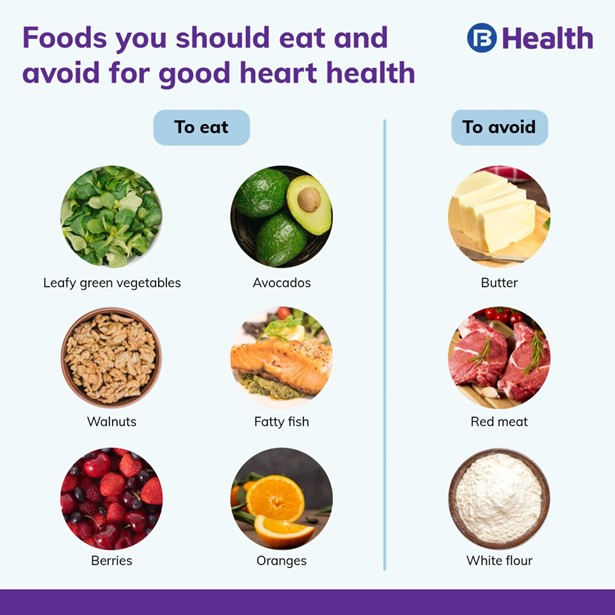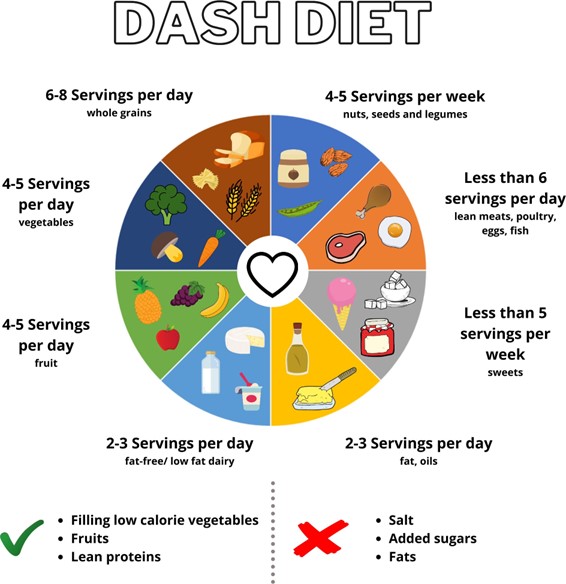A nurse is teaching a class about dietary guidelines to promote cardiovascular health. Which of the following recommendations should the nurse include in the teaching?
Increase intake of whole grains.
Increase intake of refined carbohydrates.
Decrease intake of potassium.
Decrease intake of omega-3 fatty acids.
The Correct Answer is A
In teaching about dietary guidelines to promote cardiovascular health, the nurse should include the recommendation to increase the intake of whole grains. Whole grains, such as whole wheat, brown rice, oats, and quinoa, are rich in fiber, vitamins, minerals, and phytochemicals that are beneficial for cardiovascular health. They can help lower cholesterol levels, improve blood sugar control, and reduce the risk of heart disease.
The other choices are incorrect:
Increasing the intake of refined carbohydrates is not a recommended recommendation for promoting cardiovascular health. Refined carbohydrates, such as white bread, white rice, and sugary snacks, have been associated with an increased risk of heart disease. They are often low in fiber and can cause spikes in blood sugar levels, leading to poor cardiovascular health outcomes.
Decreasing the intake of potassium is also not a recommended recommendation. Potassium is an essential mineral that plays a vital role in maintaining heart health and blood pressure regulation. Adequate intake of potassium-rich foods, such as bananas, avocados, spinach, and sweet potatoes, can help lower blood pressure and reduce the risk of cardiovascular diseases.
Decreasing intake of omega-3 fatty acids is incorrect as well. Omega-3 fatty acids, found in fatty fish (such as salmon, mackerel, and sardines), flaxseeds, chia seeds, and walnuts, have been shown to have numerous cardiovascular benefits. They can help reduce inflammation, lower triglyceride levels, improve heart rhythm, and decrease the risk of heart disease. Therefore, it is important to include omega-3 fatty acids in the diet for optimal cardiovascular health.
Nursing Test Bank
Naxlex Comprehensive Predictor Exams
Related Questions
Correct Answer is C
Explanation
Baked ham: Baked ham is typically high in saturated fat and sodium, which are not favorable for a heart-healthy diet. Consuming excessive amounts of saturated fat can contribute to high cholesterol levels and increase the risk of coronary artery disease.
Canned potato soup: Canned potato soup often contains high levels of sodium and may also be high in saturated fat, depending on the specific brand and recipe. Excess sodium intake can lead to high blood pressure, which is a risk factor for coronary artery disease. Therefore, canned potato soup is not an ideal choice for a heart-healthy diet.
Broiled salmon: Broiled salmon is an excellent choice for a heart-healthy diet. It is rich in omega-3 fatty acids, which have been shown to have cardiovascular benefits, including reducing the risk of heart disease. Salmon is also a good source of lean protein and contains
less saturated fat compared to red meats. It is recommended to choose broiled or grilled salmon rather than fried or breaded preparations to minimize added fats and oils.
Processed cheese: Processed cheese, such as cheese slices or spreads, tends to be high in saturated fat and sodium. These types of cheeses are not the best choice for a heart-healthy diet. It is better to opt for natural, low-fat cheeses or other dairy alternatives that are lower in saturated fat and sodium.

Correct Answer is D
Explanation
The DASH diet is a dietary approach specifically designed to lower blood pressure. It emphasizes consuming foods that are rich in nutrients like potassium, calcium, and magnesium, while reducing the intake of saturated fat, cholesterol, and sodium. Calcium-rich foods are an important component of the DASH diet as they have been shown to have a beneficial effect on blood pressure. Good sources of dietary calcium include low-fat dairy products, fortified
plant-based milk, leafy green vegetables, and calcium-fortified foods.
"Consume ten percent of total calories from saturated fat": The DASH diet recommends reducing the intake of saturated fat to improve heart health. The goal is to consume no more than 6% of total calories from saturated fat. Saturated fats are typically found in animal products, such as fatty cuts of meat, full-fat dairy products, and tropical oils like coconut and palm oil.
"Increase intake of refined carbohydrates": The DASH diet encourages the consumption of whole grains rather than refined carbohydrates. Whole grains are rich in fiber and other nutrients, which can help lower blood pressure. Refined carbohydrates, on the other hand, can lead to spikes in blood sugar levels and are generally less nutritious.
"Limit sodium intake to 3,200 milligrams per day": The DASH diet recommends reducing sodium intake to 2,300 milligrams per day or less. For individuals with hypertension or at risk for hypertension, including many clients with hypertension, further lowering sodium intake to 1,500 milligrams per day may be advised. Reducing sodium intake is important for blood pressure management.

Whether you are a student looking to ace your exams or a practicing nurse seeking to enhance your expertise , our nursing education contents will empower you with the confidence and competence to make a difference in the lives of patients and become a respected leader in the healthcare field.
Visit Naxlex, invest in your future and unlock endless possibilities with our unparalleled nursing education contents today
Report Wrong Answer on the Current Question
Do you disagree with the answer? If yes, what is your expected answer? Explain.
Kindly be descriptive with the issue you are facing.
